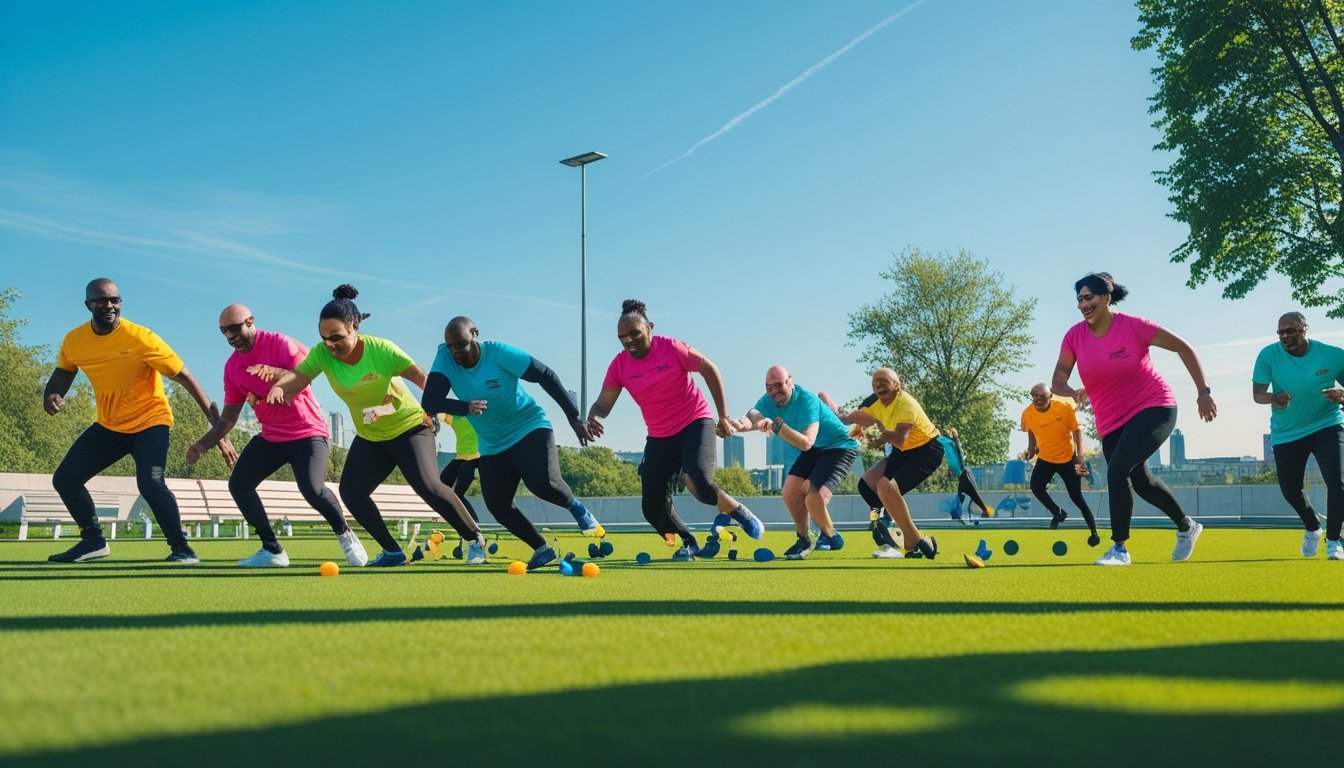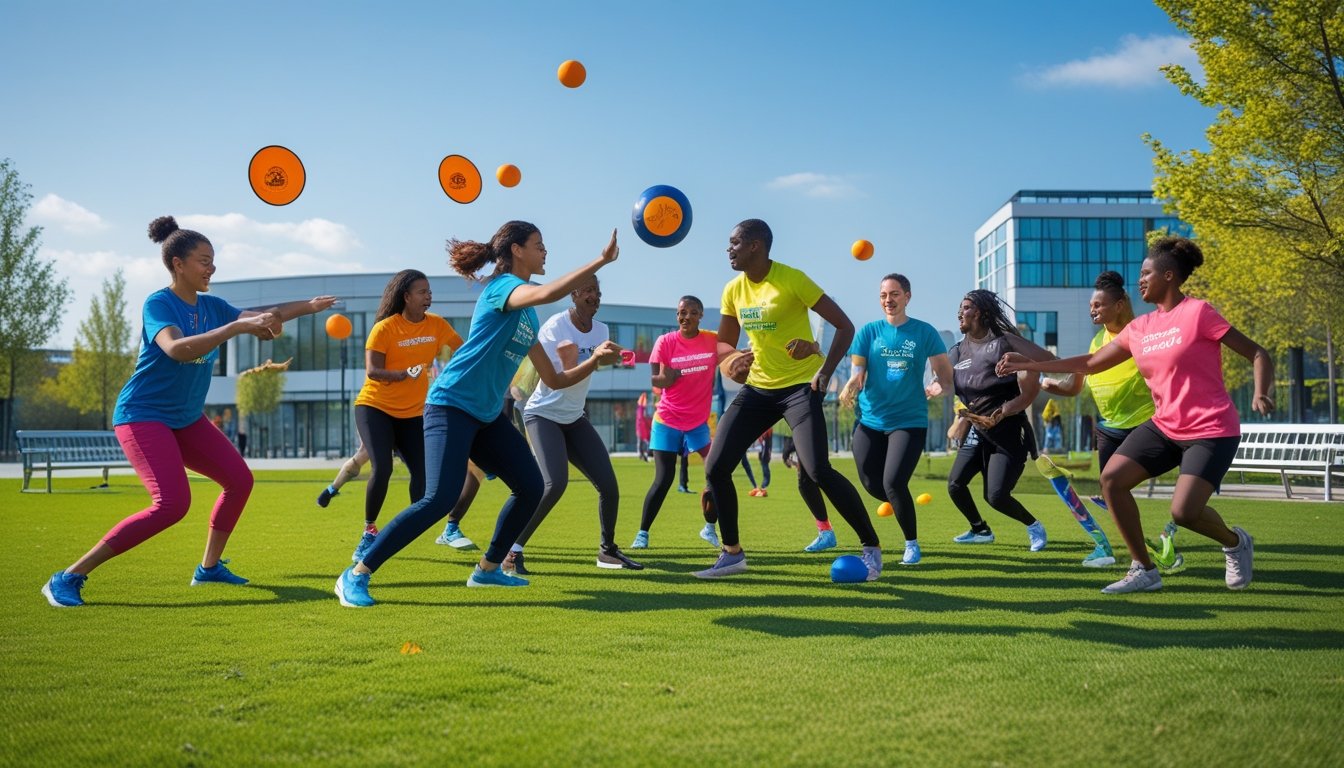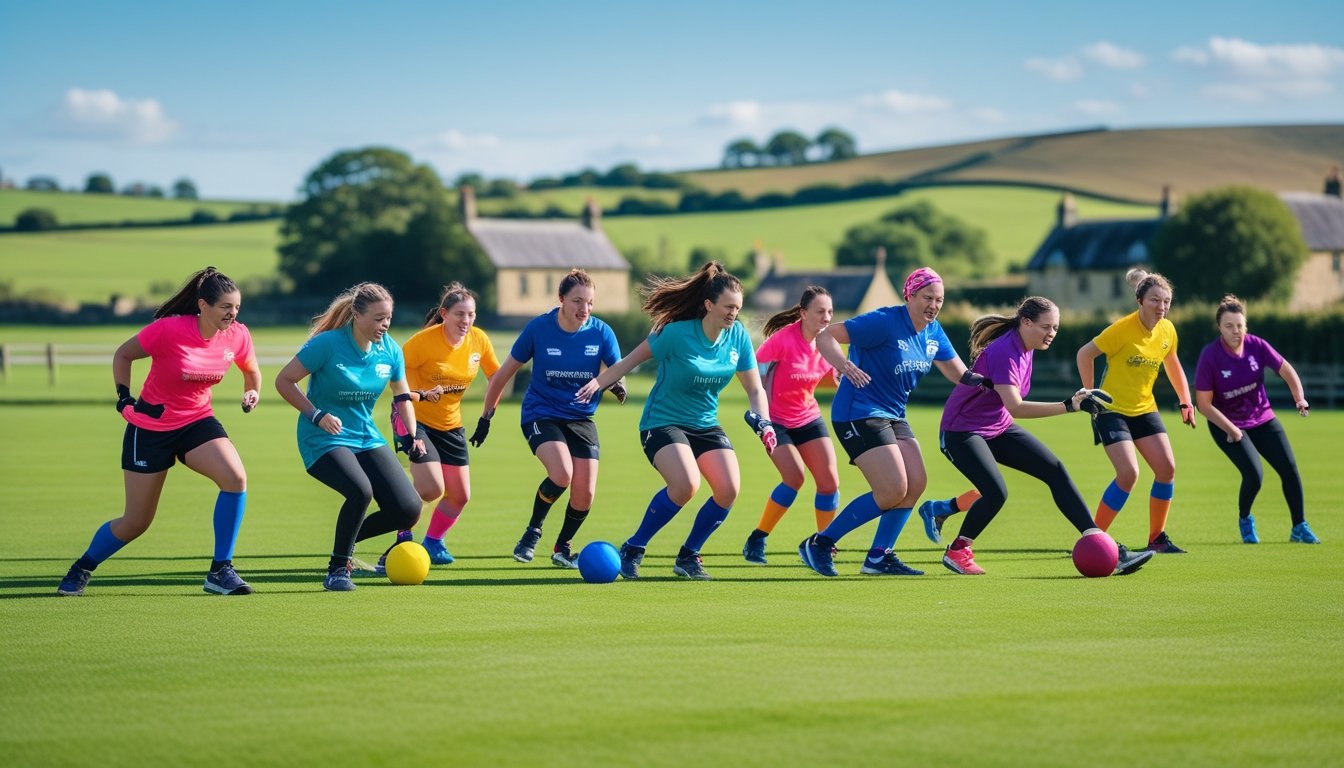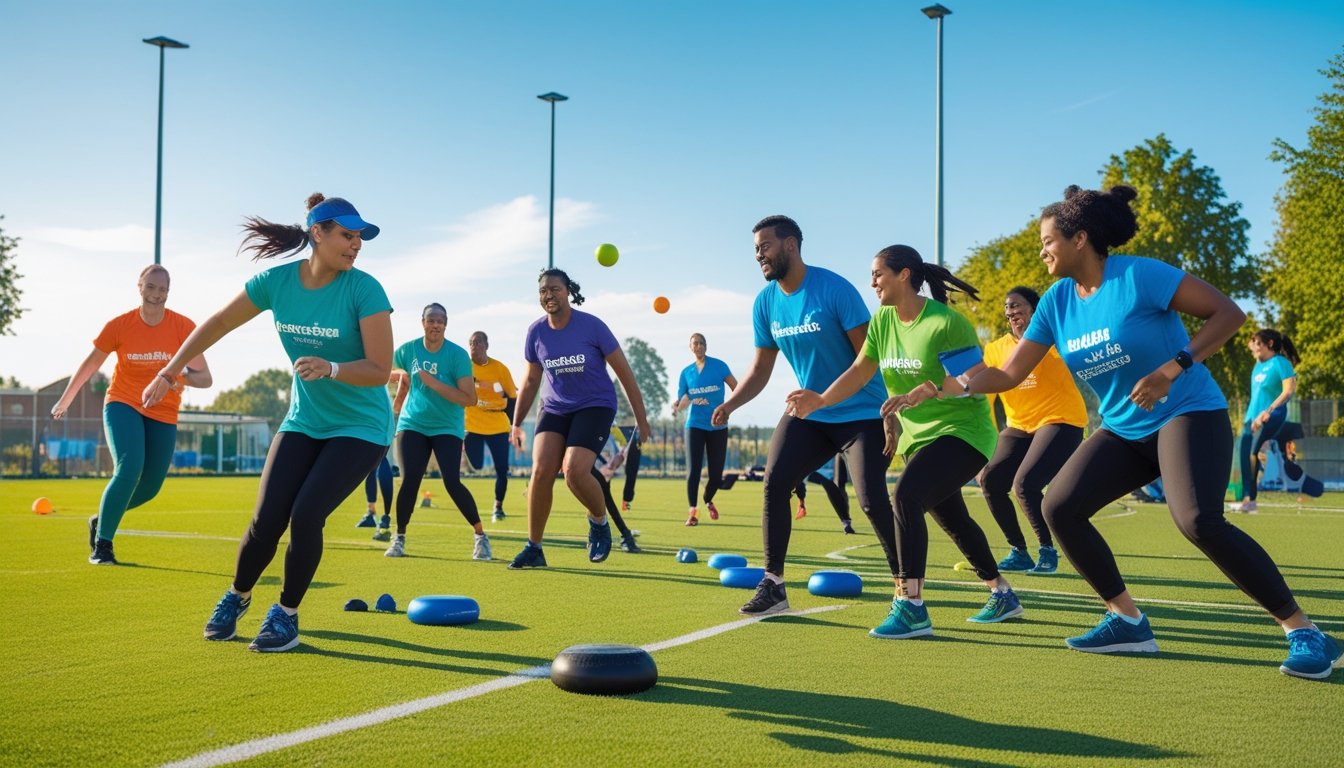Late updated: 16 Oct 2025 13:10
Written by: Emma Saunders
Exploring Non-Traditional UK Team Sports: A New Perspective
In the diverse and lively world of sports, there's a fascinating array of non-traditional team sports across the UK that often fly under the radar. These sports, with their quirky traditions and unique formats, offer a refreshing contrast to more mainstream athletic pursuits. They not only challenge the conventional boundaries of sports but also celebrate the rich tapestry of British culture.

From the captivating chaos of cheese rolling to the unusual excitement of bog snorkelling, these team sports invite participation and intrigue. Their emergence in local communities highlights how sports can unite people through shared heritage and humour. Whether you're looking to participate or simply spectate, these distinctive games provide a novel way to engage with the UK's cultural landscape.
As we explore these unconventional sports, we uncover communities that thrive on camaraderie and inclusivity. Their stories remind us of the rich diversity within the UK's sporting scene. Engaging with these activities allows us to appreciate both the historical and modern influences that make them so special.
Key Takeaways
- Non-traditional UK team sports highlight cultural diversity.
- Unusual games reflect British heritage and unique traditions.
- These sports foster community, inclusivity, and participation.
Defining Non-Traditional UK Team Sports

In the UK, non-traditional team sports are transforming the landscape of athletic participation. These sports offer exciting alternatives by incorporating unique elements that challenge traditional rules and conventions. By embracing creativity and inclusion, these activities cater to diverse interests, promoting both teamwork and societal integration.
What Makes a Sport Non-Traditional in the UK
Non-traditional sports deviate from the standard formats of games like football or rugby, emphasising innovation in their rules, equipment, or environments. In the UK, sports such as Quidditch or underwater hockey are prime examples. Their distinct characteristics often include unconventional gameplay or settings, differentiating them from mainstream sports.
Moreover, these sports thrive on the creativity and adaptability of participants, sometimes integrating local or cultural variations. They offer a platform where adaptability and innovation are not only celebrated but essential, allowing teams to devise strategies unique to their challenging formats.
Rise of Alternative and Adventure Team Activities
The rise of alternative sports in the UK reflects a growing appetite for novelty and adventure in team-based activities. Adventure sports, such as mountain boarding and parkour, blend physical skill with the thrill of exploration and new challenges. These activities stand out by their dynamic interaction with shifting and often unpredictable environments, testing courage and ingenuity.
This growing trend among the youth and various communities emphasises personal growth and collective experience rather than just victory. As interest in these types of sports grows, so does the community of passionate enthusiasts committed to expanding the horizons of team sports in the UK.
Benefits of Teamwork and Inclusion in Unconventional Sports
Non-traditional team sports foster inclusion by welcoming a diverse range of players who might not fit into conventional athletic frameworks. These activities promote teamwork, offering varied roles and strategies that accommodate different skills and strengths. Inclusivity values greatly benefit individuals seeking community and self-expression through sport.
These opportunities for shared experiences develop interpersonal skills and build strong community bonds. By participating in such sports, individuals recognise the importance of collaborative efforts in reaching common objectives, fostering a supportive environment that reinforces sportsmanship and unity. This aspect highlights the transformative power of sport in shaping harmonious and diverse team interactions.
Unique and Unusual UK Team Sports

The United Kingdom offers an array of unique sports that extend beyond the familiar realms of football and rugby. With games rooted in history and others born from modern innovation, these sports capture the quirky spirit of British culture. From the historic fields of stoolball to the quirky challenges of Dorset knob throwing, each sport provides an unforgettable experience.
Stoolball and Its Distinctive Rules
Stoolball, often regarded as the precursor to modern cricket and baseball, is a captivating sport primarily played in the Sussex region. It combines elements of batting and fielding, with teams taking turns to score runs. A bowler throws a ball underarm at a target suspended on a post, while a batter defends it with a bat.
What makes stoolball truly distinctive are its rules and format. Matches typically last about two hours, and the equipment used is minimal—a testament to its rustic roots. The game was historically popularised by milkmaids and farmworkers, and today, it remains a cherished part of the local culture.
Ultimate Frisbee: Modern Teamwork Reimagined
Ultimate Frisbee stands apart as a modern team sport that emphasises speed, strategy, and cooperative play. It captivates players with its unique blend of athleticism and sportsmanship. Teams aim to pass a flying disc down the field to score in the opposing team's end zone.
Unlike many traditional team sports, Ultimate Frisbee is self-refereed, relying on the 'Spirit of the Game' to promote fair play. This aspect fosters a unique community ethos and mutual respect among players. With each team usually comprising seven players, the sport requires both mental agility and physical stamina.
Dorset Knob Throwing: An English Biscuit Challenge
The curious sport of Dorset knob throwing highlights the playful side of British eccentricity. This event celebrates a local biscuit, known as the Dorset knob, which participants throw as far as possible. The challenge is deceptively simple but requires a surprising amount of skill and practice to master the throw.
The annual event in Dorset has gained popularity, attracting locals and visitors alike who come to test their throwing abilities or simply enjoy the peculiar spectacle. A range of fun activities and games accompany the main event, making it a light-hearted and community-driven celebration.
World Snail Racing Championships: Britain’s Slowest Race
In a testament to Britain's love for the whimsical, the World Snail Racing Championships is as charming as it is unique. Taking place in Congham, Norfolk, this event sees competitors bring their fastest garden snails to race along a 13-inch course. The race, though slow-paced, is tension-filled and exciting.
Participants must ensure their snails are properly hydrated to perform at their best. As with any competitive sport, strategies and techniques vary, and victory relies on both the choice of snail and the care it receives. It's a race that captures the imagination with its charming peculiarity and community spirit.
Frequently Asked Questions

Non-traditional team sports in the UK have been attracting interest due to their distinctiveness and ability to provide new and exciting experiences. From quirky games to more obscure team activities, there's plenty to explore.
What are some examples of non-traditional team sports gaining popularity in the UK?
In recent years, sports like quidditch, cheese rolling, and bog snorkelling have captured the imaginations of many. These sports, while on the fringe, offer unique experiences quite unlike mainstream activities. They are often celebrated for their eccentricity and fun. Others include shin-kicking and quirky races, often featured at local festivals.
How are unconventional UK team sports structured and what are the basic rules?
Many of these sports have informal and adaptable rules, reflecting their community-driven origins. For example, quidditch, inspired by the fictional game from the Harry Potter series, has a comprehensive rule set with elements borrowed from rugby and dodgeball. Conversely, cheese rolling involves chasing a round of cheese down a hill, with few formal regulations and a focus on participation.
In what ways are these non-mainstream team sports accessible to the general public across the UK?
Community events and local clubs often serve as entry points, allowing individuals to join without significant investment in equipment or membership fees. Festivals highlight these sports, offering everyone the chance to participate or enjoy as spectators. Public spaces facilitate activities, ensuring that quirky sports remain open to all interested parties.
What are the benefits of participating in lesser-known team sports in the UK?
Participation offers numerous advantages, including physical exercise, social interaction, and a chance to embrace cultural traditions. These sports also provide opportunities to learn new skills and to engage in activities that challenge the norm, enriching both personal experiences and community connections.
How do non-traditional UK team sports foster community and inclusivity?
By emphasising participation and enjoyment over competition, these sports welcome diverse groups, encouraging involvement regardless of skill level. They often celebrate local culture and customs, strengthening a sense of belonging among participants. Events draw people together, fostering friendships and shared experiences that span different backgrounds.
What initiatives exist to promote non-traditional team sports among youth in the UK?
Various organisations and clubs actively encourage younger generations to partake in these unconventional sports through beginner-friendly sessions and workshops. Schools sometimes incorporate them into physical education programs, highlighting them during sports weeks or dedicated events. Campaigns often aim to increase awareness, celebrating the joy and inclusivity inherent in these activities.
